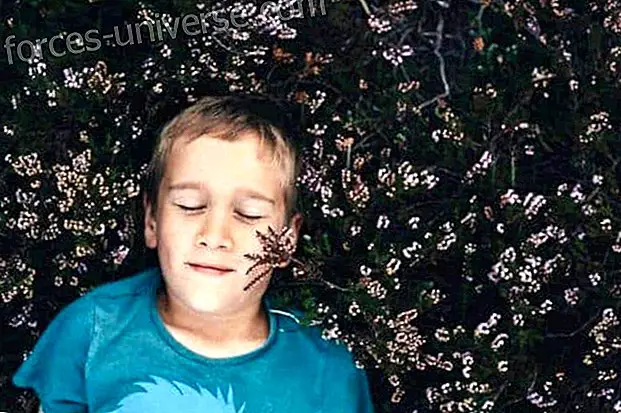Panic Attack: An approach to the causes, effects and exercises that will help you cope
- 2018

"Fear does not exist anywhere except in the mind."
Give camegie
Nausea, numbness of the body, you cannot breathe, pain in the heart, fear and the horrible feeling that you are about to die . If you know these symptoms, it is because you have had a panic attack before.
If left untreated, these attacks can become complex problems and disorders. They may even stop you from carrying out your daily activities . Fortunately, the panic attack has a solution and the sooner you seek help, the better. With the right treatment, you can reduce and eliminate panic symptoms, regain confidence in yourself and take control of your life.
Either way, and as Sun-Tzu says in The Art of War, " know your enemy and know yourself, and you can fight a hundred battles ." We will then approach the panic attack so we can know what we are dealing with.
What is a panic attack
Panic attack is a sudden period of intense fear that may be due to a number of conditions that include panic disorders, social anxiety disorders, post-traumatic stress. Ethical, drug abuse, depression and other medical problems.
While these episodes may occur as a result of some trigger, they can also happen unexpectedly . In addition, smoking and psychological stress are factors that can exponentially increase the possibility of an attack.
The most common symptoms include hyperventilation, palpitations, chest pain, tremors, choking sensation, sweating, nausea, body numbness and fear of losing the control, go crazy and even die. Some people have reported visions and the sensation of isolating themselves from everything around them . These sensations unleash the acute stress response, or fight-or-flight reaction, which prepares the body to defend itself by flooding it with hormones such as adrenaline, which acts on the nervous system. Ethic who is the main person in charge of the action of the muscles and the heart. In this way a vicious feedback was given, so that the symptoms are reinforced and the panic attack is maintained for a duration that typically goes round the half an hour, although it may extend for longer.
Most symptoms of panic attack are physical, and many times these are so severe that they can resemble a heart attack . In fact, many of those who suffer from this condition often appear repeatedly in the emergency room in an attempt to get treatment for what they believe is a problem that threatens their lives . However, while it is important to rule it out, it is usually the panic who unleashes the symptoms, and not vice versa.
Now, we have said that the panic attack causes a vicious circle behavior . So talking about the causes is also talking about the effects, because they feed each other and provoke each other. Let's name the most common.

Panic disorder
While many people experience only one or two panic attacks without major episodes and complications (if that is your case, there is not much to worry about), some people get to develop a panic disorder . These are characterized by the repetition of the attacks and the feeling of severe anxiety caused by the idea of having an attack again. This also leads you to change your behaviors and habits, being conditioned due to these episodes.
The memory of the intense fear and terror that you feel during an attack can negatively impact your confidence and cause serious changes in your daily life.
Anticipated anxiety, that is, the fear of having another episode, causes you to not relax when you are in a normal state. It is the known " fear of fear itself " and is present most of the time.
Agoraphobia
Agoraphobia is another cause and effect of panic attack. It is an anxiety disorder that consists in the fear of going through a difficult or embarrassing situation without the possibility of fleeing from it. This situation can leave the person who suffers confined to their home and unable to leave that "safe place." The essence of this condition lies in the fear of panic attack, especially in public places where the victim feels he cannot escape. This is why at first it was wrongly related to the fear of open spaces.
Other syndromes such as obsessive-compulsive disorder, post-traumatic stress and social anxiety disorder can also lead to the development of agoraphobia.
It is one of the most harmful effects of panic disorders, as the main risk of this is that it can prevent the person who suffers from going out to seek help.
Severe stress
In addition, the panic attack is usually related to the suffering of stress . Loss of a loved one, the breakup of a relationship, big changes can trigger the episodes. People with anxious temperaments, with an excessive need for security, hypochondriacal fear and an extremely cautious look at the world have been linked to panic attacks. In adolescents, they can also affect social transitions.
The panic attack occurs in most cases as a result of direct exposure to an object or situation for which they have phobia .
Treatment for panic attack
The most effective way to deal with panic attacks, agoraphobia and other disorders is with therapy . Even a short period of treatment can help.
Professionals agree that the combination of cognitive and behavioral therapy is the best treatment for these episodes. These therapies focus on thinking about patterns and behaviors that trigger panic attacks and seek to observe your fears with a more realistic look. That way, you can understand that even under the effects of a panic attack, you can control the actions . The moment you realize that nothing disastrous has to happen, the experience of the episode becomes less terrifying.
Exposure therapy for panic disorders allows you to experience physical sensations in a safe and controlled environment . So you can have the opportunity to incorporate healthier ways of dealing with attacks. You can even consciously simulate the symptoms of tremor and hyperventilation to induce a state similar to panic . With each exposure, the sensations experienced become more known, you become more aware of them and gradually increase your control over the situation . The result achieved by facing your fears is that you understand that the situation itself is not harmful, and as soon as you control your actions you are not in any danger.

How to deal with a panic attack
While therapy turns out to be the best option, it is advisable to be prepared to deal with a sudden attack in case you are alone.
1. Use your breath
When we are going through a panic attack, our breathing becomes short and shallow. If we become aware of it and begin to breathe slowly and deeply, our brain interprets that the danger is happening and can begin to end the episode. If you are able to control your breathing, you are less likely to experience hyperventilation that begins to cause symptoms and panic attack.
Concentrate then on taking a deep breath by inhaling and exhaling through your mouth, feeling the air slowly fill your chest and belly, and then slowly letting go. Inhale counting to four, hold the air a second and then exhale counting up to four again.
2. Recognize that you are the victim of a panic attack
Recognizing that it is a panic attack and not a heart attack, may remind you that it is a temporary situation, what will happen and that, despite what you are feeling in That precise moment is fine. Remove from the middle the fear that causes you to believe that you are going to die, because it is nothing more than a symptom of the episode . This may allow you to focus on the techniques to reduce the impact of this attack.
3. Close your eyes
Some panic attacks are triggered by situations that overwhelm you. If you are in an accelerated environment, full of stimuli, this may fuel the possibility of an attack. To reduce the stimuli, keep your eyes closed during the episode . This will also make it easier for you to concentrate on breathing.
4. Practice full awareness
The fact that you learn to develop your attention to what is happening with your body is very useful to go through the panic attacks. That way it becomes more possible for you to remain aware of what is really happening . Since the panic attack can cause the sensation of abstraction and separation from reality, this can be an important tool that must be taken into account.
Focus on the physical sensations you already know, such as resting your feet on the floor or feeling the texture of the fabric of your clothes on your skin. This will give you something objective to put your attention to.
5. Look for something external as an object of attention
Some people find it useful to find some object that is around to focus all attention on it . Choose something that is in sight and consciously note everything you can about it.
For example, you can notice how the clock hand shakes when it moves, or the shape of the design on the cover of a book.
Describe the patterns, colors, shapes and sizes of the object for yourself, and focusing your attention on that will allow the symptoms to subside.
6. Use techniques to relax your muscles
Similar to reducing the frequency of your breathing, techniques to relax your muscles can help you stop the panic attack. This happens because you start to take control of the body's response . Consciously relax one muscle at a time, starting with something simple like the fingers of your hands, and go through your entire body.
These types of activities are much easier to implement if they have been previously carried out.
7. Visualize your happy place
What is the most relaxing place in the world you can think of? A sunny beach with the gentle sound of the waves breaking on the coast? A cabin in the mountains? Allow yourself to travel wherever you want in your imagination. Visualize yourself there and focus on the details as much as you can. Imagine burying your feet in the warm sand, or feeling the scent of pine trees.
This place should be quiet, peaceful and relaxing. No traffic, speakers or phones ringing.
8. Perform some type of light exercise.
Exercise causes the blood to fill with endorphins and send them to all parts of the body, which can help us improve our mood . When stressed, you should choose the gentle exercise that sets the body in motion, such as walking or swimming.
If you are hyperventilating, it is better to wait to catch your breath first.
9. Keep lavender always at hand
Lavender is known for its stress-relieving effects. She can help you relax in those tense moments. If you know that you have a predisposition to fall into episodes of panic attack, always keep a handful of lavender on hand and breathe its essence. You can also try drinking lavender or chamomile tea, since both are relaxing.
Lavender should not be combined with benzodiazepine, as this may cause severe dizziness.
10. Help yourself by repeating a mantra internally
Those who practice meditation know that repeating a mantra internally can help us relax and maintain our safety. Also, it gives you something to hold on to while the panic attack is happening. So simply repeat " this will also happen " or a personal mantra, repeat it in a circle in your head until the feelings of the attack begin to subside.

Coping with panic attacks
Given all these considerations about what concerns panic attack, it will be much easier for you to deal with those situations that seem to get out of hand. Remember that during one of these episodes you are not at real risk, but everything is in your head.
In case a person around you has a panic attack, you can assist him in the same way you would if it were you. Put these tips into practice and remember that for the person who is living it, the danger feels too real . Asking him to calm down or trying to minimize his fear will not help him. But if you manage to drive him out of it, you may even give him a tool with which to face future episodes.
Keep calm Make it move, raise and lower your arms. Get him out of his head by having him name and talk about things that interest him.
Once the attack is over, the person may feel ashamed of it. Support them to seek help to control their anxiety.
You can be of great help to someone.
Do not miss the opportunity.
AUTHOR: Lucas, editor of the great family of hermandadblanca.org
SOURCES:
- https://www.helpguide.org/articles/anxiety/panic-attacks-and-panic-disorders.htm
- https://en.wikipedia.org/wiki/Panic_attack
- https://www.healthline.com/health/how-to-stop-a-panic-attack#1






